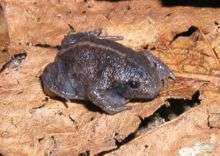Rhinophrynidae
| Rhinophrynidae Temporal range: Late Jurassic to present, 155.7–0 Ma | |
|---|---|
 | |
| Juvenile Rhinophrynus dorsalis | |
| Scientific classification | |
| Kingdom: | Animalia |
| Phylum: | Chordata |
| Class: | Amphibia |
| Order: | Anura |
| Family: | Rhinophrynidae Günther, 1859 |
| Type genus | |
| Rhinophrynus Duméril and Bibron, 1841 | |
The Rhinophrynidae are a family of frogs containing one extant genus, the monotypic Rhinophrynus,[1][2][3][4] and a number of fossil genera.[3][5][3] The family is sometimes known as the Mexican burrowing toads[1] or simply burrowing toads.[2]
Rhinophrynus occurs in the Central America north from Costa Rica to Mexico and Texas.[1] Fossil finds of Rhinophrynidae come from Mexico, the United States, and Canada.[5] Rhinophrynus is a burrowing ant and termite eater.[2][4]
Systematics
The Rhinophrynidae are the sister taxon of the Pipidae.[1] The clade formed by these two genera is sometimes referred to as Xenoanura[4] or superfamily Pipoidea.[6]
Genera
The affinity of Eorhinophrynus is uncertain.[3]
References
- 1 2 3 4 5 Frost, Darrel R. (2016). "Rhinophrynidae Günther, 1859". Amphibian Species of the World: an Online Reference. Version 6.0. American Museum of Natural History. Retrieved 22 April 2016.
- 1 2 3 4 "Rhinophrynidae". AmphibiaWeb: Information on amphibian biology and conservation. [web application]. Berkeley, California: AmphibiaWeb. 2016. Retrieved 22 April 2016.
- 1 2 3 4 5 6 Blackburn, D.C.; Wake, D.B. (2011). "Class Amphibia Gray, 1825. In: Zhang, Z.-Q. (Ed.) Animal biodiversity: An outline of higher-level classification and survey of taxonomic richness" (PDF). Zootaxa. 3148: 39–55.
- 1 2 3 Vitt, Laurie J.; Caldwell, Janalee P. (2014). Herpetology: An Introductory Biology of Amphibians and Reptiles (4th ed.). Academic Press. p. 476.
- 1 2 3 "Family Rhinophrynidae (burrowing toad)". Paleobiology Database. Fossilworks. Retrieved 22 April 2016.
- ↑ Ford, Linda S.; Cannatella, David C. (1993). "The major clades of frogs". Herpetological Monographs. 7: 94–117. doi:10.2307/1466954. JSTOR 1466954.
This article is issued from Wikipedia - version of the 10/20/2016. The text is available under the Creative Commons Attribution/Share Alike but additional terms may apply for the media files.